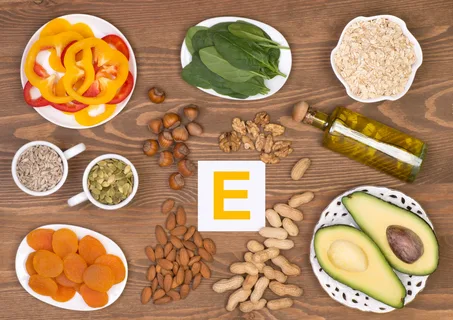Vitamin E is a vital nutrient that plays a crucial role in maintaining overall health. It is a powerful antioxidant that helps protect cells from damage, supports immune function, and promotes skin health. While supplements are available, getting Vitamin E naturally through your diet is the best approach. This guide will provide comprehensive information on how to increase your Vitamin E intake naturally, including the best food sources, benefits, and practical tips.
Understanding Vitamin E
What is Vitamin E?
Vitamin E is a fat-soluble vitamin with eight different compounds, including tocopherols and tocotrienols. Alpha-tocopherol is the most active form in the human body and is primarily responsible for Vitamin E’s beneficial effects.
Importance of Vitamin E
Vitamin E is essential for:
- Antioxidant Protection: Neutralizing free radicals that can cause cellular damage.
- Immune Function: Enhancing the body’s immune response.
- Skin Health: Promoting healthy skin by preventing oxidative damage and supporting skin repair.
- Eye Health: Protecting the eyes from age-related damage.
Best Food Sources of Vitamin E
Nuts and Seeds
Nuts and seeds are among the richest sources of Vitamin E. Incorporate the following into your diet:
- Almonds: One ounce provides about 7.3 mg of Vitamin E.
- Sunflower Seeds: One ounce offers around 7.4 mg.
- Hazelnuts: One ounce contains about 4.3 mg.
- Pine Nuts: One ounce provides 2.6 mg.
Leafy Greens
Leafy green vegetables are not only packed with nutrients but also contain significant amounts of Vitamin E:
- Spinach: One cup of cooked spinach offers 3.7 mg.
- Swiss Chard: One cup of cooked chard provides 3.3 mg.
- Kale: One cup of cooked kale contains about 1.1 mg.
Vegetable Oils
Certain vegetable oils are excellent sources of Vitamin E:
- Wheat Germ Oil: One tablespoon contains 20 mg.
- Sunflower Oil: One tablespoon provides 5.6 mg.
- Safflower Oil: One tablespoon offers 4.6 mg.
- Olive Oil: One tablespoon contains 1.9 mg.
Fruits
Incorporating various fruits can help boost your Vitamin E intake:
- Avocado: One medium avocado provides about 4.2 mg.
- Mango: One cup of sliced mango offers 1.5 mg.
- Kiwi: One medium kiwi contains around 1.1 mg.
- Blackberries: One cup provides 1.7 mg.
Other Sources
Other foods rich in Vitamin E include:
- Broccoli: One cup of cooked broccoli offers 2.3 mg.
- Squash: One cup of cooked squash contains 2.6 mg.
- Tomatoes: One cup of cooked tomatoes provides 1.4 mg.
Tips for Increasing Vitamin E Intake
Incorporate Vitamin E-Rich Foods into Meals
Adding Vitamin E-rich foods to your daily meals can significantly boost your intake:
- Breakfast: Add almonds or sunflower seeds to your cereal or oatmeal.
- Lunch: Include avocado slices in your salads or sandwiches.
- Dinner: Use olive oil for cooking or as a salad dressing and incorporate steamed or sautéed leafy greens like spinach or Swiss chard.
Snack on Nuts and Seeds
Keep a stash of nuts and seeds handy for a quick, healthy snack. Almonds, sunflower seeds, and hazelnuts are easy to carry and can be eaten on the go.
Use Vegetable Oils in Cooking
Replace your regular cooking oil with Vitamin E-rich oils like sunflower, safflower, or olive oil. These oils can be used for sautéing, frying, or as a base for dressings and marinades.
Experiment with Smoothies
Blend fruits like mango, kiwi, and avocado into smoothies for a delicious and nutritious Vitamin E boost. You can also add a handful of spinach or other leafy greens to enhance the Vitamin E content.
Include Vitamin E-Rich Vegetables in Recipes
Incorporate broccoli, squash, and tomatoes into your recipes. These vegetables can be added to soups, stews, casseroles, and pasta dishes.
Health Benefits of Vitamin E
Antioxidant Properties
Vitamin E’s primary function is to act as an antioxidant, protecting cells from oxidative damage caused by free radicals. This helps reduce the risk of chronic diseases such as heart disease and cancer.
Skin Health
Vitamin E supports skin health by protecting against UV damage, reducing inflammation, and promoting skin healing. It is commonly found in skincare products for its anti-aging and moisturizing properties.
Immune Support
Vitamin E enhances immune function by supporting the production of white blood cells, which are essential for fighting infections. Adequate Vitamin E levels can help maintain a robust immune system.
Eye Health
Vitamin E helps protect the eyes from age-related damage and conditions such as cataracts and macular degeneration. Its antioxidant properties reduce oxidative stress in the eyes.
Heart Health
Vitamin E may contribute to heart health by preventing the oxidation of LDL cholesterol, which is a key factor in the development of atherosclerosis. It also helps maintain healthy blood vessels.
Practical Considerations
Balance Your Diet
While focusing on Vitamin E-rich foods, ensure your diet remains balanced with other essential nutrients. Include a variety of fruits, vegetables, whole grains, and lean proteins.
Cooking Methods
Vitamin E can be sensitive to heat and light. To preserve its content in foods, opt for cooking methods like steaming or sautéing rather than frying or prolonged baking. Store oils in dark, cool places to prevent degradation.
Potential Interactions
High doses of Vitamin E supplements can interact with certain medications, such as anticoagulants, and increase the risk of bleeding. Always consult with a healthcare provider before starting any supplement regimen.
FAQs
What are the symptoms of Vitamin E deficiency?
Vitamin E deficiency is rare but can cause symptoms such as muscle weakness, coordination and balance problems, vision issues, and a weakened immune system.
Can I get too much Vitamin E from food?
It is unlikely to get too much Vitamin E from food sources alone. Excessive intake usually occurs from supplements, which can lead to toxicity.
Are there different types of Vitamin E supplements?
Yes, Vitamin E supplements come in natural and synthetic forms. Natural forms, labeled as “d-alpha-tocopherol,” are more bioavailable than synthetic forms, labeled as “dl-alpha-tocopherol.”
How does Vitamin E benefit the skin?
Vitamin E benefits the skin by protecting it from UV damage, reducing inflammation, promoting wound healing, and moisturizing dry skin.
Can Vitamin E help with hair health?
Yes, Vitamin E can improve hair health by enhancing circulation to the scalp, providing antioxidant protection, and supporting overall hair growth and strength.
Is it safe to use Vitamin E oil directly on the skin?
Yes, using Vitamin E oil directly on the skin is generally safe. It can help moisturize, reduce scars, and promote healing. However, some people may experience allergic reactions, so a patch test is recommended.
How does cooking affect Vitamin E content in food?
Cooking can reduce the Vitamin E content in foods, especially with prolonged exposure to heat and light. Opt for gentle cooking methods and store oils properly to preserve their Vitamin E content.
What is the recommended daily intake of Vitamin E?
The recommended daily intake of Vitamin E for adults is 15 mg (22.4 IU). This amount can be achieved through a balanced diet rich in Vitamin E-containing foods.
Can children benefit from Vitamin E?
Yes, children need Vitamin E for growth and development. Ensuring they consume a diet rich in Vitamin E foods will support their overall health and immune function.
How can I ensure I get enough Vitamin E if I follow a plant-based diet?
A plant-based diet can provide ample Vitamin E through nuts, seeds, leafy greens, vegetable oils, and fruits. Incorporate a variety of these foods to meet your daily Vitamin E needs.
Conclusion
Increasing your Vitamin E intake naturally through a balanced diet is an excellent way to support your overall health. By incorporating nuts, seeds, leafy greens, vegetable oils, and fruits into your meals, you can ensure you receive adequate amounts of this essential nutrient. Remember to balance your diet with other vital nutrients and choose cooking methods that preserve Vitamin E content. With these tips, you can enjoy the numerous benefits of Vitamin E and maintain a healthy lifestyle.
- How To Use Kratom Capsules For Stress And Anxiety Relief - May 31, 2025
- Smokers Lines Lip & Mouth Fillers Near Laleham, Surrey - May 31, 2025
- What Is Toxic Positivity And How It Hurts Relationships - May 31, 2025

